HIT CHANNEL EXCLUSIVE INTERVIEW: October 2024. We had the great honour to talk with a legendary singer: Phil Mogg. He is best known as the vocalist of UFO for more than 50 years, releasing with them classic albums such as “Phenomenon” (1974), “Lights Out” (1977) and “Strangers in the Night” (1978). In September, Phil’s new band, Moggs Motel released their first self-titled album on Steamhammer/SPV. Read below the very interesting things he told us:
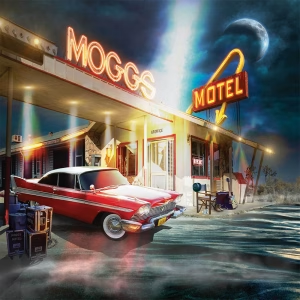 Are you satisfied with the response you got so far from fans and press for “Moggs Motel” album?
Are you satisfied with the response you got so far from fans and press for “Moggs Motel” album?
Yeah! The response has been really good and we are very pleased. It turned out well and yeah, the response has been overall very good.
Please give us some information about the songwriting process of “Moggs Motel”. How were these songs written?
I met Tony (ed: Newton -Voodoo Six, KK’s Priest bassist and producer) after I stepped down from UFO, by chance, I bumped into Tony and I was talking to him about doing some songs and he said: “Well, I’ve got some stuff” and I said: “Check it over to me”. We were just going into the Covid lockdown and he was sending me material and Neil (ed: Carter -UFO guitarist, keyboardist, vocalist) said: “Oh, I’ve got some stuff” so, it was all by chance. I worked on most of the tracks here during that lockdown period, there was nothing else to do. So, I did the vocals to the tunes and then when that was all over, when we were freed up, we went in a studio to record.
How important was the contribution of Tony Newton and Neil Carter in “Moggs Motel”?
Yeah, it was a good 100% important and it was more like the old days when we used to get together and muck around with songs. There was no pressure, there was no record company, we were just doing it ourselves. So, Neil and Tony were great and came through with a lot of good stuff and Joe (ed: Lazarus -drums) and Tommy (ed: Gentry -guitar) were the icing on the cake.
Is this album as kind of statement that you are alive and well and still rocking?
(Laughs) Ah, very good. I don’t know. I never thought about it like that. It could be. I didn’t approach it from that point of view, but I’ll go with that, that’s fine. I’m alive and well, thank you very much.
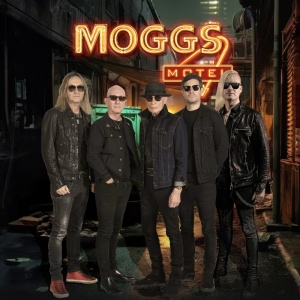 I really like “Sunny Side of Heaven” song featuring Zoe Devlin Love from Alabama 3. Please tell us everything we should know about this beautiful song.
I really like “Sunny Side of Heaven” song featuring Zoe Devlin Love from Alabama 3. Please tell us everything we should know about this beautiful song.
We already got Neil (ed: Carter -guitar, keyboards, vocals) who does lots of backing vocals, but we wanted to try a female voice and Tony, by chance, knew Zoe for they worked on something else before, so he rang her up and she put down the vocals straight off and it worked a treat. That’s why we have Zoe’s (ed: vocals) on a couple of other tracks, too, just to balance the album out with her vocals, but she was a delight.
“I Thought I knew You” is very addictive. What inspired you to write it?
It’s about someone you know but you think: “I thought I knew you” but then you suddenly see right through them and you think: “Oh my god, it’s not the person I thought I knew”. You know, that kind of thing.
Could you please explain to us the Kalashnikov reference on “Tinker, Tailor” (“I hear the rattle, I hear the cough/ They’ve given baby a Kalashnikov/ Load up the wagon and let’s have a toast /I’m going drinking with John Wayne’s ghost”) ?
In America there is always a show going on, they have one of those of what they call “gun shows” in the afternoon where the families go out and they can buy anything and that’s where most of the weapons come from. But it was just like saying: “They’ve given baby a Kalashnikov”, kids have guns, that kind of thing. “I’m going drinking with John Wayne’s ghost”, a bit like the Old West.
Was it an interesting experience to record “Moggs Motel” at Steve Harris’ (Iron Maiden’s leader and bassist) studio in Essex?
Yes, it got a great pop down the road, it’s a really nice house. So, it was very comfortable. It was out in the country, it’s just off the motorway; I get there easy, Tony lives around the corner. It was great, very convenient, nice and cosy.
Will there be any Hunter S. Thompson (author of “Fear and Loathing in Las Vegas”) suite in your motel?
Oh, I don’t know if I can have one there. We ‘ve got a “Frank Sinatra Suite”, a “Dean Martin Suite”, a “Sammy Davis Jr. Suite”, an “Angie Dickinson Suite”, because she was in the Rat Pack, too. Yeah, it was all related to the ‘50s Rat Pack.
Are there any touring plans for Moggs Motel?
Hopefully, we’ll get to do a couple of festivals next year, and if not, because they all will get booked out so quickly, we’ll probably do about half a dozen gigs and see how we fare. Yeah, doing like that. This is the rough plan.
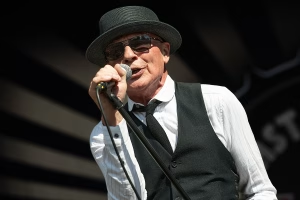 How much did the heart attack you suffered in 2022 change your perspective on life?
How much did the heart attack you suffered in 2022 change your perspective on life?
Well, I suppose is back to live each day, one of those kinds of things. Being a little a more grateful for what you ‘ve got. You know, that kind of thing. It makes you very well aware of your own mortality because you literally breathe through the life and you are thinking: “Aaah, this is great!” Yes, it’s a wake-up call.
How do you feel that eventually you never played the final scheduled UFO concert in Athens in October 2022?
There was no chance we were going back on the road after I had the event. So, there was no chance of finishing that tour and I thought: “That was it”. I haven’t been on the road since, but I have been singing. No, there wasn’t any chance us doing that after the heart attack thing.
Why are there so many trains in your lyrics?
Have I got any trains in this one? Let me think… I dodn’t remember being a train there. If I haven’t got one in, I can certainly put one in. I don’t actually recall, I try to find a lyric there. If there is a train in there maybe it is because where I grew up there were train tracks, trains used to run along with the bottom of the house. I don’t know. I have no idea. I have to check out this album because I don’t remember a train being in there.
You are talking about John Wayne’s wagon in “Tinker, Tailor”.
Oh, like a wagon train! I don’t think it is meant to be a train, I think it is meant to be a wagon train.
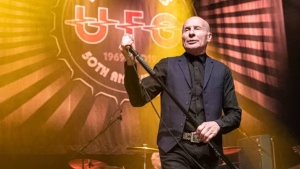 In your opinion, what makes the music of UFO still relevant in 2024?
In your opinion, what makes the music of UFO still relevant in 2024?
I know Chrysalis (ed: their ‘70s label) has been putting out the re-releases, the deep sessions and stuff and that seems to do rather well. I think it’s probably a generation thing. Sometimes people discover something that missed, they missed that period of bands. I think The Jam are back in the charts with an old song. I think it’s a rediscovery. People are thinking: “Oh, this could be good”. That’s my theory, anyway.
Did you feel a lot of pressure when you decided to continue the band after Pete Way’s (bass) departure in 2008?
Oh yeah, Pete was a major part of the band and there was a lot of part missing when he went, but he was having some problems which he needed to sort out. So, yeah, it was a bit of disappointment when we were hoping that at some point he might come back, but no, he didn’t. Yeah, it was a disappointment.
Was Pete Way an easy-going person to work with?
From what I can recall, yeah, he was. When you are at school, if there is a bloke sitting next to you who might bring about a little bit of trouble or be mucking around or shouting around, that would be Pete. So, it would be like you grew up with someone was who constantly mucking around, not that I wasn’t but yeah, it was more like schoolmates.
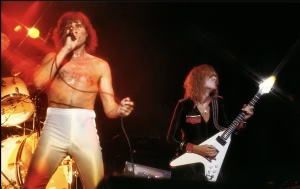 What was your first reaction when you watched Michael Schenker (guitar) playing live with Scorpions?
What was your first reaction when you watched Michael Schenker (guitar) playing live with Scorpions?
We needed a guitarist. Bernie Marsden (ed: future Whitesnake guitarist) hadn’t shown and we played with Scorpions previously somewhere and we had seen Michael before and we asked Rudy (ed: Rudolf Schenker -his older brother and Scorpions guitarist) : “Could we borrow your guitarist?” and he said: “Yes, you can borrow Michael”, so, that was our first playing encounter.
What was Michael Schenker’s greatest skill?
I would say he can pick a melody. That’s what I would say: He can pick a melody, when pushed.
Why Bernie Marsden (Whitesnake -guitar) didn’t join the band before getting Michael Schenker?
We were trying all different things out. I think before Bernie we had Larry Wallis from The Pink Fairies, actually, he played in Motorhead, he was their first guitarist. We had Larry and then that it didn’t work out because he took his boots off mid-song -anyway, that’s a long story- and so, Bernie came in and it gave it more of a blues flavour which we wanted that slightly bluesy feel, but that didn’t work out either. Just by chance Bernie wasn’t around for the gig and Michael stepped in, so that was a done deal.
Is it flattering that “Doctor Doctor” (from “Phenomenon” -1974) is Steve Harris’ favourite song?
Yes, I suppose it is. I hear they play it when they go on stage, so yeah, it’s very flattering. Thank you, Steve.
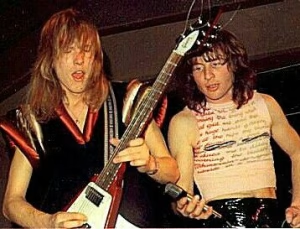 Could you please share with us the story behind the writing of “Rock Bottom” (from “Phenomenon” -1974)?
Could you please share with us the story behind the writing of “Rock Bottom” (from “Phenomenon” -1974)?
We had that from a rehearsal, as I recall -I could always be wrong here- and I was really late with the vocals and got there (ed: in the studio) on the day and we knocked out the riff and the vocals as raw as it was in the rehearsal. So, “Rock Bottom” was a very raw take.
How important was Ron Nevison’s (Bad Company, Thin Lizzy producer/engineer) contribution to “Lights Out” (1977) album?
Oh, most important. Yeah, I think that was when we got together and said: “We really need to make the great leap forward” and we looked at various engineers and Ron’s name always popped up on albums we liked. So, we went to get Ron and thankfully Chrysalis got him. Like I said, it was a change for us, we went a step up.
Does “Strangers in the Night” (1979) live album capture the real atmosphere of a UFO concert?
I would say, yeah. Yeah, it sounds just like it did and very much so. From “Brooksy” (ed: Steve Brooks -Rush’s concert sound technician), he used to work for Rush, the bloke who says: “Hello Chicago!” in the beginning (ed: of “Natural Thing”). Yeah, he was a road crew guy from Rush giving the announcement. So, I think right from that bit into the live stuff, it sounds for a live album, pretty good.
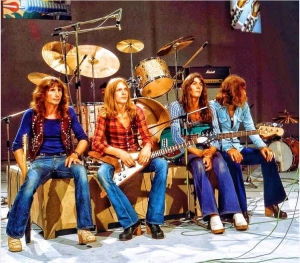 What was the real reason of Michael Schenker’s departure during the mixing of “Strangers in the Night”?
What was the real reason of Michael Schenker’s departure during the mixing of “Strangers in the Night”?
(Laughs) So many, I don’t know. It was so long ago, I don’t recall. If there was anything, it would be probably something to do between what Ron (ed: Nevison -producer) wanted and what Michael wanted and obviously, Ron would end up the winner. So, I think probably along those lines, but that had nothing to do with me (laughs).
I’ve read that he didn’t like the live version of “Rock Bottom”.
I believe Ron’s point of view for that album was: “It’s a live album” and he didn’t want to change anything or he‘d leave everything as much as he could. So, I believe that’s probably where they locked horns. As I said, it had nothing to do with me.
Was it a difficult decision to replace Michael Schenker with Paul Chapman in 1978?
Yeah, Paul had been in the group before; we had two guitarists, Paul Chapman and Michael. When Michael went we were looking for different guitarists and went through a lot of guitarists and Paul was the best for the band. Yeah, that’s it. Paul was actually the best for the band.
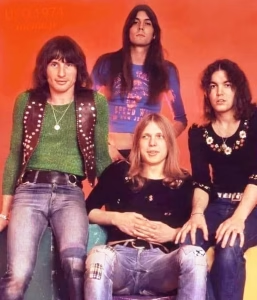 What memories do you have from your collaboration with George Martin (The Beatles producer) on “No Place to Run” (1980) album?
What memories do you have from your collaboration with George Martin (The Beatles producer) on “No Place to Run” (1980) album?
That was a bad idea that was going months around; it was highly expensive. It was one those things the bands got sold: “Oh, we‘ll go to an island (ed: at George Martin’s AIR Montserrat studio in Montserrat, in the Caribbean) to record”, whilst it was absolutely lovely, it was really a great place to work. George was extremely good, Geoff Emerick (The Beatles) was the engineer, he was excellent and he made us all welcome and he made it a jolly time.
Do you think UFO should have been more popular?
I don’t know. UFO has been up and down like a yo-yo. We went up and we came down, then, we went up. We reached some really good highs and I’m thinking things pan out how they do and I’m very happy to be part of it. No, I think UFO primarily is (ed: popular).
Do you remember the UK tour in 1983 with the Greek band Socrates as your opening act?
Oooh, yeah (ed: he is surprised) ! Yeah! Yeah, I remember the name. Yes, yes! Socrates. “Hey, they look Greek, are they?” I know, I know (ed: that they were Greek). Fancy that!
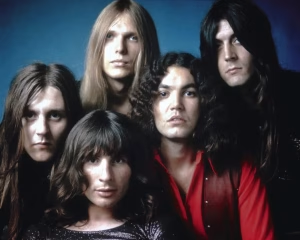 Could you imagine the UFO album covers without Storm Thorgerson’s (Hipgnosis studio – he made album covers for Pink Floyd, Scorpions, Led Zeppelin) artwork?
Could you imagine the UFO album covers without Storm Thorgerson’s (Hipgnosis studio – he made album covers for Pink Floyd, Scorpions, Led Zeppelin) artwork?
I think that period ended, too. That album cover style ended with Hipgnosis, when they used to pack up. At that point, when they were doing covers for us, they did the Zeppelin and the Pink Floyd ones, but we got Hipgnosis at a great time. We got some really good covers from them.
Were you frustrated by Michael Schenker’s behaviour at Manchester Apollo in 2000 (during the show, a visibly drunk Schenker handed his guitar to Mogg to play a key solo, later pointing to the singer and telling the audience: “This guy sucks”, then admitting: “I suck, too”) ?
It reached the point where nothing really surprises you. It didn’t come as a great shock, it wasn’t a big surprise. It’s just disappointing: You can’t finish the gig, we had fans who travelled, paid a lot of money and that left them disappointed. So, it all wound up as a disappointment.
Do you think Vinnie Moore (guitar) fitted with the band?
Vinnie just took it in a different direction. We went in a different direction. I ‘d say Vinnie had a more coming influence on the band. It was not that we get on and did the gigs. It just took it in a different direction.
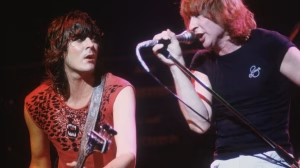 How did it happen to get Jason Bonham to play drums on “You Are Here” (2004) album?
How did it happen to get Jason Bonham to play drums on “You Are Here” (2004) album?
He was held up (laughs). It’s a bit of a joke. “He was held up. He did it for the money”. No, Jason was playing with Spike’s band, The Quireboys. I saw them, I think it was, at The Underworld in London and he was leaving The Quireboys and we needed a drummer and I said: “Do you want to do this?” and he said: “Yes, sure. I’m between gigs”, so he came onboard.
How much impact did The Animals concert you watched as a kid have on you?
That was all part of the combination. I saw John Mayall’s Bluesbreakers, The Animals, The Who, the Small Faces, the Rolling Stones, etc. There was a whole package of discovery, it was quite marvelous.
What were your thoughts when punk rock movement broke out?
Funnily enough, it didn’t actually affect us much. We were over doing a lot of working in America and most of the punk thing was in the UK; it was not an awful lot of thing in the States. Thankfully, we were still managing to play our gigs. But I thought the punk thing is great, it was a bit of a clearout. You know, someone going around with a duster, really clean.
I think you were punks before punk rock.
(Laughs) Big mouths, yeah. We were a bit a little loud.
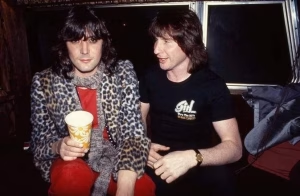 You love Tangerine Dream’s “Love on a Real Train” (from “Risky Business” soundtrack -1984). What’s so special about this piece?
You love Tangerine Dream’s “Love on a Real Train” (from “Risky Business” soundtrack -1984). What’s so special about this piece?
Oh, I mentioned that to someone about night driving. If you drive at night in a bus or a coach when it goes quiet, all the drunks have gone to sleep, but if you put “Love on a Real Train” and you are sitting on the bus with all the likes fleshing past gigs; it goes with driving on the road. Try it, sometime!
You have toured with many bands. Who were the nicest guys on the road?
They were all good. Actually, AC/DC were great to tour with, Rush were great to tour with, most of the bands we toured. The Doobie Brothers were excellent, yes. They had a plane which was taking them from gig to gig and somebody said: “Hey, get in to the next gig”. I think it was Baxter (ed: Jeff “Skunk” Baxter -guitarist and original member of Steely Dan). We said: “Well, we ‘ll get the proper airline thing” and he said: “Why don’t you come on our plane?” We said: “How much is it gonna cost us?” We were thinking we were gonna get charged for this and he said: “Charged? No! Come on our plane” and it was a knockout. They were very generous people, yeah.
Did you get on well with Bon Scott (vocals) when you toured with AC/DC in 1979?
Oh, he was a scream. He was a really nice guy and very funny. Great combination (laughs) ! Yes, he was very nice and very funny. In other words, that was great, that was a great tour.
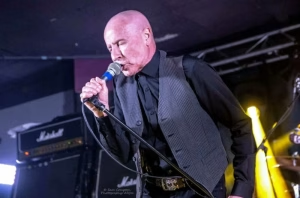 Humour has been a vital part of your life. Should rock music have more of it?
Humour has been a vital part of your life. Should rock music have more of it?
I think so. I definitely think some of the possible musicians tend to take themselves very seriously, which I can understand a certain amount of seriousness, but sometimes you say: “Hey, you are overserious about it”, it becomes a bit of a yawn than: “Hey, this is a rock band! Let’s have a good time!”. So, I just think that sometimes they are a little bit of overserious, that was all.
Do you have any musical ambitions left?
I don’t know, they pop up. The ambitions pop up while you are walking along. You could be sitting somewhere and an ambition would pop up. So, you never know what’s around the corner.
I am a huge Steve Marriott (Small Faces, Humble Pie -vocals, guitar) fan, too. What do you like the most about him?
I saw them on Top of the Pops doing “All or Nothing” (ed: Small Faces -1966). The voice was so big out of such a little frame. I think it was really cool when he switches his guitar around his back, sticks his finger in his ear and he really builds it out. It was very impressive, you saw him and you thought: “Oh, this bloke is good”, you know, that kind of thing.
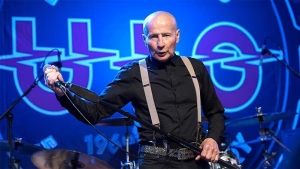 Do you think popular music that was written in the ‘60s and ‘70s is much better than today’s music?
Do you think popular music that was written in the ‘60s and ‘70s is much better than today’s music?
It seems that there is a lot of blandness in today’s music. I can’t bear pop radio because it’s like lift music, so you have to dig out stations that play rock. I did definitely dig some of the older stuff that came out during that period, I think it was unsurpassable. I mean, in the ‘60s there was an explosion of new, different stuff. I don’t think it’s (ed: today’s music) as exciting as that, but then again it’s difficult to say, isn’t it (laughs) ? It’s a bit like: “You are old, you were there. Maybe it wasn’t for me”. I think the old stuff is really cool.
Do you think because of the streaming services listening to an album from start to finish has now become a kind of lost art?
Yeah. I think you are right, there. It’s mainly the fact that on streaming you pick out tracks, so you don’t actually get the full flavour of the album. I’ve listened to this one (ed: “Moggs Motel”) all the way through, anyway.
A huge “THANK YOU” to Mr. Phil Mogg for his time. I should also thank Björn von Oettingen for his valuable help.
Official Moggs Motel website: http://moggsmotel.co.uk/
Official Moggs Motel Facebook page: https://www.facebook.com/profile.php?id=61560145255152
Official UFO website: http://www.ufo-music.info/

